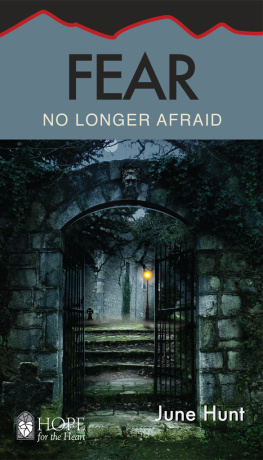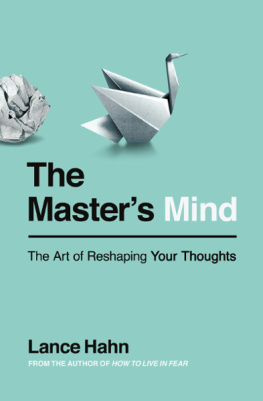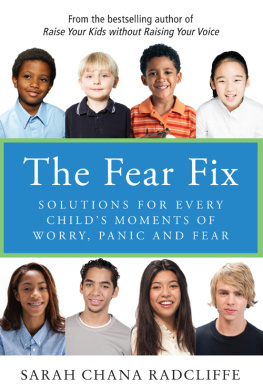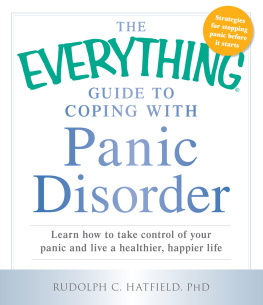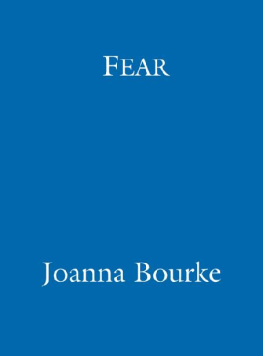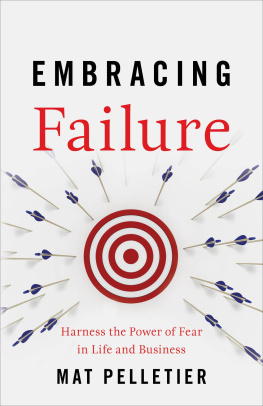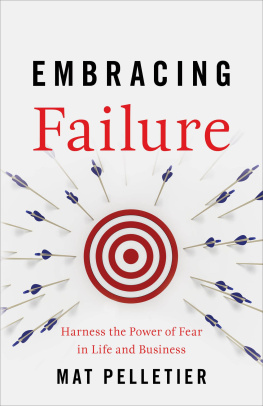W HEN MY BOOK The Gift of Fear was first published, some people recoiled from the title. Fears not a gift I want! people told me. Really? You dont want to receive natures brilliant survival signal, the signal most likely to warn you of danger?
Similarly, some may recoil from Thom Rutledges concept of embracing fear. This feeling we run from, this emotion that controls so many people, can be, as this book makes clear, our most effective and protective allybut first we have to know what it is, and what it isnt.
We confuse true fear with unwarranted fear, mixing them up with anxiety, worry, and dread as if theyre all the same. So to define our terms:
- True fear is a signal in the presence of danger. It is always based upon something we perceive, something in our environment or our circumstance.
- Unwarranted fear is always based upon our memory or our imagination.
In day-to-day life, you can quickly tell the difference between the two. Imagine, for example, youre about to board a flight and youre suddenly overtaken with dread and uncertainty about the pilots ability to fly the plane. If that dread is based on a plane crash you saw on the news three weeks ago, it is unwarranted fear. If the fear is based upon seeing the pilot stumble out of the airport bar, its the real thing.
True fear is the messenger that intuition sends when the situation is urgent, and its not easily quieted. If you want it to leave you alone, whatever questions it poses must be answered. Thom helps us find those answers. Hes a funny, compassionate teacher whose class could be called Fear 101or more intelligently I suppose, Embracing Fear.
Thom shows us the power we gain when we stand up to fearand the bullies who deliver it. Governments have embraced fear, but in a much different way than Thom suggests. Throughout history governments have used fear as the perfect method for persuading (and often bullying) populations to accept actions they might otherwise resist. All governments on earth want their citizens to believe that only the government can protect them, and they know this works best if they generate fears that are new and improved. The old fears just dont get our attention as well.
The fear du jour for both the government and the news media, as if you need a reminder, is terrorismbut its always something. Its as if theres a space in our collective mind reserved for things that frighten us, and that space must be kept occupied. If we are not fearing terrorism, its mad cow disease, or killer bees, or gas-tank fires, or dangerous tires. Before September 11, we feared enemies within: AIDS, asbestos, the vengeful coworker, the local serial killer, the home invasion robber, the rampaging high-school student.
A scientific poll conducted before $$$; asked Americans what they feared, revealing a virtual catalogue of catastrophes right off the television news. About a fifth of the respondents reported a fear being in an air crash.
This isnt surprising given that, through the magic of video, we are there whenever a plane falls to earth, wherever on earth that happens to happen. So there are people who drive to the airport obsessing about their plane crashing even as they do something far riskier than flying: drive without paying attention.
While 20 percent of Americans were worried about being in an air crash, 18 percent worried theyd become victims of mass violence. The two fears collided on $$$, so, while the percentages of fearful people would be higher today, my point is that these fears are not new.
Even before $$$;, there were people whod cancel a trip to see the pyramids in Egypt for fear of being killed by terrorists, and then stay in Detroitwhere the risk of homicide is twenty times greater!
One in three Americans fears being a victim of a violent crime, even though only one in one hundred and fifty actually will be. This fear of being harmed by other people is understandable (though often misplaced), but what about the fear of electromagnetic fields (16 percent of Americans), or the fear of foreign viruses (30 percent)? I actually met a lady with that fear, by the way. Where? In a television news studio, of course. The station was doing a special segment on a lethal new disease virtually certain to kill us all before the end of sweeps week. It was a scary sounding, hard to ignore, got-to-see-this, Honey, get in here! made-for-TV disease. As you may have already guessed, it was the flesh-eating disease. Lacking anyone who actually suffered from the malady, television officials brought in a woman who was worried that she might have it. I was introduced to her before she headed to the studio, and as I watched her interview, it crossed my mind that she could have told me all this before shaking my hand. But no matter, she didnt have it, and I didnt catch it, and neither will you.
Whats left to fear? Well, more than a third of Americans fear getting food poisoning from meat, a fear as rich in irony as meat is rich in cholesterol, because uncontaminated or safe meat contributes to many more deaths than does food poisoning each year.
When I think like this (you know, reasonably), I hear the words of the television news producer in Chicago who assured me that A little worry never hurt anybody, and that is just not so. Through high blood pressure, heart disease, depression, addiction, and a myriad of other stress-related ailments, anxiety kills more Americans each year than all the foreign viruses, bad meat, electromagnetic fields, and airplane crashes put together.
Think of the times your mind just wouldnt stop chewing on something, just couldnt stop tossing and turning on its own bed of nails, just couldnt find peace. Television news is that exact same mental energy given a billion dollars in resources, inspired to dwell on every fear, wired to propel itself far and near, spinning around the world until it reaches terminal velocity.
The news media is a giant mind, a giant unquiet, over-stimulated mind that wont let itself restand wont let the rest of us rest either.
In millions of homes, newscasters are guests who arrive in the afternoon full of frightening tales and gory pictures. They stay through dinner, enthusiastically adding grisly details that make the kids wince, and theyre still around at bedtime to recite a scary story or two. While newscasters are showing slides of their awful vacation, you slump to sleep, only to find in the morning that they are still there, eager and fast talking, following you around the kitchen warning you about the dangers of coffee.
Little wonder we Americans are steeped in anxiety and unwarranted fear: having lived through the previously unthinkable, our minds are more open to the unfathomableand television news has rushed through that opening. We are built to anticipate whats coming next, and television feeds this natural interest with stories about things that arent actually coming next: worst-case scenarios and dark predictions delivered by presentable-looking experts who validate our wildest worries. Footage from past disasters is mixed with scary graphics; in all the confusion, the qualifying words (might, allegedly, possibly, could, potentially, conceivably) drop from consciousness, leaving only the sense that danger is everywhere around us. Combine the words, the graphics, the logos, the music, the urgency and you end up with a small amount of information hidden behind an unhealthy dose of sensationand the sensation is fear.


